A Stiff Neck Resulting In Pain And Restricted Motion Is Often The Cause Of A Specific Neck Muscle
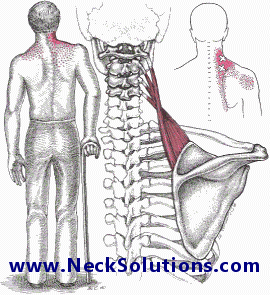 Often, people will complain of pain in the neck upon waking. Usually the stiff neck is described as pain in the neck/shoulder and restricted motion, especially to one side. The culprit is often the levator scapula muscle.
Often, people will complain of pain in the neck upon waking. Usually the stiff neck is described as pain in the neck/shoulder and restricted motion, especially to one side. The culprit is often the levator scapula muscle.
As you can see from the picture, this muscle runs from the neck to the top of the shoulder, and can effect both areas. Therefore, the stiffness is not only when moving the neck, it can be caused by moving the arm as well. Usually, you can feel a very tender spot where the muscle attaches to the scapula at the base of the neck or top of the shoulder area.
Waking with a stiff neck can be related to a pillow that lacks proper support. Sleeping on your side with one side too high or low can stretch or contract this muscle during sleep. This can be made worse if sleeping next to a cold draft from a window or ceiling fan. The stiffness causes difficulty in turning the head, especially the painful side. Compensating for the stiff muscle, one will often have to use the body to turn instead of the neck and this can cause problems especially when driving.
Additional causes are other common strained muscles, poor computer ergonomics when spending long periods using a computer, causing forward head posture. For those who use a traditional phone, tilting the head when using the phone by supporting it between your neck and shoulder greatly contracts the muscle and a poorly adjusted chair with the arm rests placed too high which raises the shoulders up further contracting the muscle. As indicated in the example, long periods spent with this muscle in a shortened, contracted state can cause a neck stiffness, like using a walking cane or a crutch that is too high.
Neck stiffness resulting from strain of the levator scapula can radiate to the upper back, inside the shoulder blade, into the shoulder and may even go to the head to cause neck related headaches. Imagine watching a tennis match for hours as you are sitting in the middle, following the movement of the ball from side to side, again and again.
Activities stressing the muscle like swimming, lifting weights without proper form and even emotional states can cause neck muscle tightness. Did you ever feel like you were holding the weight of the world on your shoulders? Feeling stressed out can cause this muscle to tighten without even noticing it until there is accumulated stiffness and pain. This is another way that strained neck muscles can cause a tension headaches.
One major part of the martial arts style I studied was to learn how to perform the motions while keeping the shoulders down, head up and straight. Learning how to release the tension in this manner helps to prevent a stiffness and trains muscle memory, which can help throughout the day.
How To Treat A Stiff Neck
Treating this can be frustrating. Typically, there is pain and there may be some inflammation. There are degrees involved in a stiff neck. There may be a general soreness from sustained contraction or overstretching of the muscle or there may be additional muscles involved as indicated in the neck strain section. Additionally, there is no rule that only one muscle is involved. Often, there are other factors. There can be minor tears in the muscle and the connection between the muscle and bone (tendon) may be involved. If it is more severe, there can be involvement of the ligaments which form the connection between the bones. Joints can be affected which can all lead to a stiff neck syndrome.
Basically, there are some things you can do to help regarding initial attempts for treatment. For the pain and inflammation, you can take an anti-inflammatory like Ibuprofen, if there are no problems regarding side effects. There are certain areas that tend to form problems within the muscles called trigger points which can be a focus of pressure therapy. Massage can help in relief of pain and to help bring circulation to the area.
Many will recommend ice or cold therapy, treating it more like a traumatic type injury. Actually, ice may cause the muscle to further tenses and increase the stiffness. Some people can not tolerate cold on the neck, therefore, moist heat is recommended. It is important that it is moist heat and not a dry heat, which can cause more inflammation and blood stagnation. This can be achieved by standing under a shower, using a small towel and running hot water on it, wringing it out and placing on the neck. However, the most effective method is using a heating pad that is designed to provide moist heat and contoured to fit the neck and shoulders. They provide a more consistent level of moist heat and you can control the temperature of the heat and amount of treatment time. One of the biggest mistakes is it for using too long.
Heat can be applied before massage and to help relax the muscle before using traction. Traction type collars are easy to use and can help reduce stress on the muscles. Certain traction collars allow the force to be placed more or less to one side, which can target a muscle more specifically. Helping to ease pressure on the muscles from the weight of the head, many will use these devices while working.
Topical preparations can be helpful and these should be used only after heat is applied. Have someone use a application like the joint relief roll on to gently work it into the muscle for a few minutes. The active ingredients provide a distraction from the pain, while the herbs used in this formula can penetrate and help ease and heal a stiff neck. It is also possible to increase the effect of light massage using a special herbal liniment and this is a common practice within martial arts. If preferred, you can use pain relief patches which helps healing herbs penetrate deep into the muscle over a longer period of time as an alternative to liquid based rubs or sprays.
Become familiar with do’s and dont’s of proper neck posture. Learn techniques of stress reduction such as breathing exercises to help reduce tension, any related headache and to help oxygenate the muscles.
If you are waking up with a stiff neck, it is a sign that your pillow may not be providing proper support. Since we sleep 6 to 8 hours, this can be a chronic source of waking with pain and one that can easily be remedied with a pillow specifically designed to keep proper support and relax the muscles like a functional pillow.
Stress reduction methods like breathing exercises can help reduce muscle tension and associated headaches. This also has relation to reducing poor posture which can have a big impact on the strength of the neck and proper tension of the muscles. If you work long hours at a computer, you must make some changes ergonomically to reduce the stress on the muscles. Please have look at how to improve sitting related postures.
There is a method used in oriental medicine with an acupressure point for neck pain located in the hand. This is an easy method to use while taking a break to relax and can assist in working in conjunction with some of the other methods previously described.
Final Thoughts
The causes of a stiff neck can be simple or more involved and we have concentrated on one of the main muscles involved and some methods used in treatment. However, if the pain and stiffness persist for more than a few days or it gets worse regardless of home treatment attempts, always consult your health care provider for neck treatment related to more serious conditions.
A 2015 study in BMC Musculoskeletal Disorders indicated neck pain patients showed an overall stiffer and more rigid neck motion pattern with poor flexibility, slower movement speed and more rigid head motion patterns. Gentle stretching of the neck is good to gain and maintain flexibility and fluid motion.

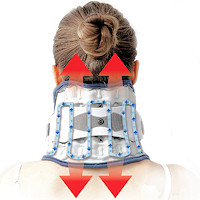 Neck Traction Devices
Neck Traction Devices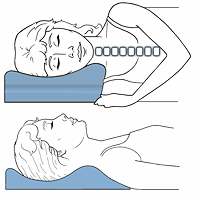 Cervical Pillows
Cervical Pillows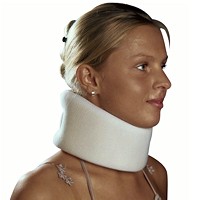 Neck Support Collars
Neck Support Collars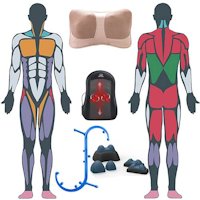 Muscle Therapy Tools
Muscle Therapy Tools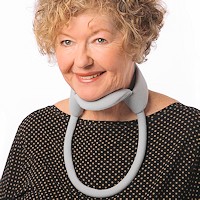 Head Supports
Head Supports Topical Pain Relievers
Topical Pain Relievers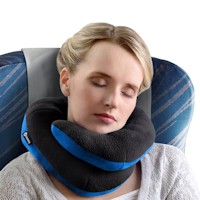 Special Pillows
Special Pillows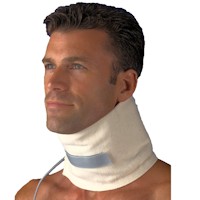 Heat Therapy
Heat Therapy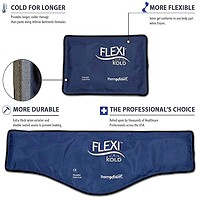 Cold Therapy
Cold Therapy Ergonomic Aids
Ergonomic Aids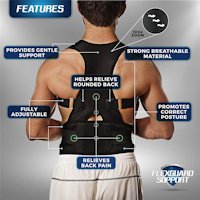 Posture Braces
Posture Braces Relief Supplements
Relief Supplements